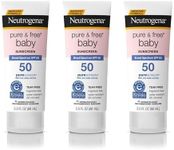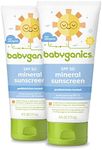Buying Guide for the Best Sunscreens For Babies
Choosing the right sunscreen for your baby is crucial to protect their delicate skin from harmful UV rays. Babies have sensitive skin that can easily burn, so it's important to select a sunscreen that offers effective protection while being gentle enough for their skin. When shopping for baby sunscreen, consider factors such as the level of sun protection, the ingredients used, and the ease of application. Always test a small amount on your baby's skin to check for any allergic reactions before applying it more broadly.SPF (Sun Protection Factor)SPF measures how well a sunscreen can protect skin from UVB rays, which are the main cause of sunburn. For babies, it's recommended to use a sunscreen with an SPF of at least 30, which blocks about 97% of UVB rays. Higher SPF values, like 50, offer slightly more protection but no sunscreen can block 100% of UV rays. Choose an SPF based on how long your baby will be in the sun and their skin sensitivity. If your baby has very fair skin or will be in intense sunlight, opt for a higher SPF.
Broad Spectrum ProtectionBroad spectrum sunscreens protect against both UVA and UVB rays. UVA rays can prematurely age the skin, while UVB rays can burn the skin. Both types contribute to skin cancer. It's important to choose a sunscreen labeled 'broad spectrum' to ensure comprehensive protection. This is especially important for babies, as their skin is more susceptible to damage. Always check the label to confirm that the sunscreen offers broad spectrum protection.
IngredientsThe ingredients in sunscreen can affect its safety and effectiveness. For babies, mineral-based sunscreens containing zinc oxide or titanium dioxide are often recommended because they sit on top of the skin and reflect UV rays without being absorbed. These ingredients are less likely to irritate sensitive skin. Avoid sunscreens with chemical filters like oxybenzone, which can be harsh on a baby's skin. Always read the ingredient list and choose a product with gentle, baby-safe components.
Water ResistanceWater-resistant sunscreens are designed to remain effective for a certain period while swimming or sweating. This is important if your baby will be in the water or playing outside in hot weather. Water resistance is usually labeled as 40 or 80 minutes. Choose a sunscreen with the appropriate level of water resistance based on your baby's activities. Remember to reapply sunscreen after the indicated time, or sooner if your baby is towel-dried.
Application MethodSunscreens come in various forms, including lotions, sticks, and sprays. Lotions are easy to apply and ensure even coverage, which is important for thorough protection. Sticks are convenient for small areas like the face, but may be harder to spread evenly. Sprays can be quick to apply but may not provide consistent coverage and should be used with caution to avoid inhalation. Consider your baby's tolerance and your convenience when choosing the application method.
















